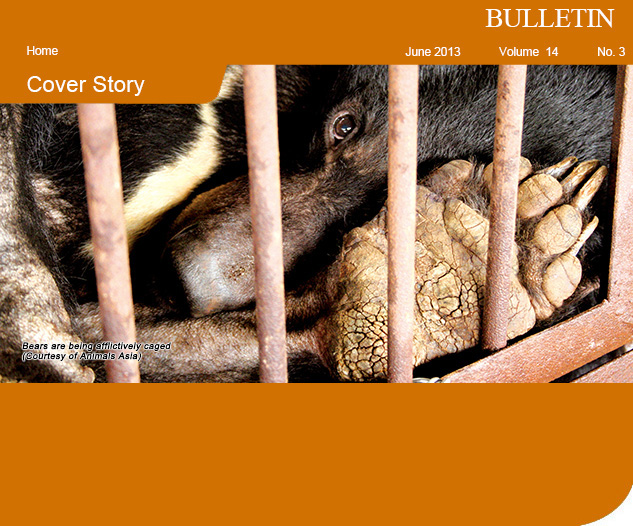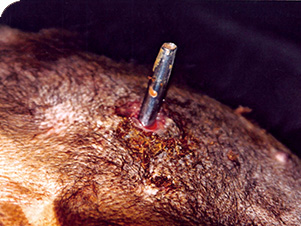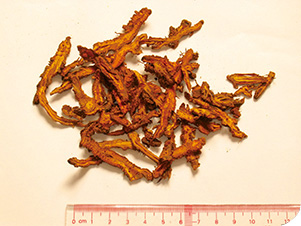| Saving the Bears
in the Name of Science |
|
| Traditional Chinese medicine draws on evidence from more than 2,000 years of use, but there are cultural beliefs attached to it, too, especially about the powers of certain ingredients. Dr Feng Yibin and his colleagues have been tearing the two apart in their work on the controversial use of bear bile and the development of new drugs. |

|
Bear bile has a long history in Chinese medicine. Some 123 Chinese medicine products are made with bear bile and more than 180 enterprises are engaged in its production. But the extraction of the bile – which involves either caging bears, opening their abdomens and sticking tubes in to ‘milk’ their gall bladders, or killing them for their gall bladders – has attracted outrage from animal rights campaigners. The Asian black bear commonly targeted for this process has also been put on the vulnerable list by the World Conservation Union. To Dr Feng Yibin, Associate Professor in the School of Chinese Medicine, all of this makes bear bile an important focus of research. “The bear is now endangered and it has a high cost in the market, which makes it even more attractive to people because they think if they pay more, it will be more effective. It is our duty to use scientific research to find a substitute for this product and stop this cruel practice,” he said. That substitute is a herb called coptis (huang lian), which comes under the same category as bear bile in the Chinese medical classification system. Over the past few years, Dr Feng and his team, working with HKU’s Department of Chemistry, have shown that the two have similarities in their bioactivity. More importantly, in cell and animal models, coptis was just as effective as bear bile, and sometimes better, in treating liver disease and cancer – two of the main uses for bear bile. Separating science from culture Their work was the first to demonstrate the pharmacological similarities of coptis and bear bile and it was published internationally. However, given the nature of Chinese medicine, those findings are not yet enough to save the bears. “The scientific data shows that coptis is one of the best substitutes for bear bile. But for Chinese people it is hard to get them to accept this. Many people believe in the history and culture of bear bile, so it is a long struggle to get them to stop using it,” he said. This is what Dr Feng calls the ‘art’ of Chinese medicine. “We want to change people’s attitude by determining the usefulness of Chinese medicine with science and seeing what, from its 2,000-year history, can stand up to evidence-based research,” he said. It is not only bear bile that is coming under his microscope. He has been working with Hui Wai Haan Chair of Chemistry, Professor Che Chi-ming, who discovered a new class of saponin compounds. Dr Feng then tested this in cell and animal models of liver cancer to show how and why it was effective. |
 |
“We want to change people’s attitude by determining the usefulness of Chinese medicine with science and seeing what, from its 2,000-year history, can stand up to evidence-based research.” |
||
| Dr Feng Yibin |
|
New drug development Such cooperation is essential in the investigation of Chinese medicines. The herbs, animal and mineral ingredients used are made up of complete compounds, unlike the pure isolated compounds of Western drugs, and there can be dozens of compounds in just one herb. A decoction of various ingredients can conceivably have hundreds of compounds. “Professor Che has first-class advanced technology to analyse the complete compounds in Chinese medicine and this is important to our work,” Dr Feng said. The hope is that science will lead to the development of new drugs from Chinese medicines – as well as prove the efficacy of alternatives, such as coptis in place of bear bile – and that people will be convinced by the hard factual findings. Some have argued that an isolated compound is not as good as the ‘real thing’ but “while completely replacing a real Chinese medicine in chemical compositions is really difficult, producing pharmacological effects that are better than the real products is possible and a reality,” he said. “By knowing the active compound we can isolate it and get it in higher concentrations. This can make it easier to create a drug for wider use in the world.” Apart from his work with Professor Che, Dr Feng also works closely with Professor Tsao Sai-wah, Professor Yuen Man-fung, Li Shu Fan Medical Foundation Professor in Medicine, and Dr Man Kwan in the Faculty of Medicine, to push Chinese medicine research into the international arena through multidisciplinary studies. |
 Steel catheters are implanted in the abdomen of bears for bile extraction
(Courtesy of Animals Asia) Steel catheters are implanted in the abdomen of bears for bile extraction
(Courtesy of Animals Asia)
|
 Coptis is one of the best substitutes for bear bile Coptis is one of the best substitutes for bear bile |
||
| Back | Next |